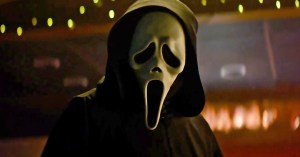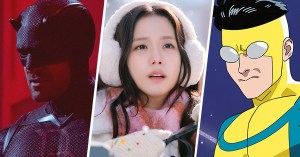Definitive Sandra Bullock Movies
In this week's Total Recall, we take a look at the films that helped define the career of the Our Brand Is Crisis Star
Her rise to fame in the mid 1990s was followed by a box office drought so profound that it was hard not to wonder if she’d ever find her way out of it – but the 21st century has been pretty good to Sandra Bullock so far, granting her successes both commercial (Miss Congeniality, The Proposal) and critical (Crash, Gravity). To celebrate that resurgence, as well as the arrival of her latest release, the political dramedy Our Brand Is Crisis, we decided to devote this week’s Total Recall to a look back at 10 of Ms. Bullock’s most essential films!

The year before Speed turned her into a household name, Sandra Bullock scored a supporting role in Demolition Man, a future-set, Joel Silver-produced action extravaganza that pitted Sylvester Stallone against Wesley Snipes in a battle so big that even Sting showed up for the soundtrack. (Possibly just for the opportunity to repurpose an old Police tune as a solo track, but still.) As corrections officer Lenina Huxley, Bullock gave Stallone his most adorably diminutive co-star since Estelle Getty in Stop! Or My Mom Will Shoot — and her character’s fascination with icky 20th-century culture helped inject a touch of relatability (and, let’s face it, sex appeal) into what would otherwise have been just your garden-variety blockbuster about two impossibly built dudes blowing stuff up as they try to kill each other with the fate of the world hanging in the balance. While not a classic by any stretch, Demolition Man lived up to the mayhem implied in its title, increased Bullock’s profile at the box office, and earned begrudging approval from critics like Chris Hicks of the Deseret News, who wrote, “with Snipes giving his role everything he’s got — a considerable amount by any measure — and with some amusing bits tying together the action scenes, there is plenty of eye candy at work here, which should satisfy action fans.”

It shouldn’t have worked, really. Six years after Die Hard, audiences had been subjected to variations of its wildly successful theme that transplanted the action everywhere from a boat (Under Siege) to a mountain (Cliffhanger), and by the time Speed came along, the news that it was “Die Hard on a bus” should have kept moviegoers away in droves. But a funny thing happened instead: Speed turned out to be a lot of fun, not only for the audiences who bought $350 million in tickets, but most critics, too. One of the year’s most successful films, Speed acted as a cinematic coming-out party for Bullock, who stars as a bus passenger roped into helping SWAT explosives expert Jack Traven (Keanu Reeves) figure out how to outwit a maniac (Dennis Hopper) who has wired the vehicle with a bomb that will detonate if the bus dips below 50 mph. Though not a few critics were quick to point out the film’s various plot holes, the direction (courtesy of Die Hard cinematographer Jan de Bont) and script (featuring work from an uncredited Joss Whedon) were set to run with such mechanical precision that the movie only needed a pair of charismatic leads to make it work. Reeves and Bullock worked so well together that the leftover goodwill they generated was enough to sell over $100 million in tickets to The Lake House eight years later — but instead of blaming them for that mess, let’s focus on the words of Peter Travers, who counted himself as an early Bullock supporter in his review of Speed: “The smart and sassy Bullock is a knockout. She makes us believe the impossible things Annie is doing and, better, makes us care.”

When you’re hot, you’re hot — and in the mid 1990s, Sandra Bullock was on a roll, going from 1994’s Speed to While You Were Sleeping in 1995, and vaulting herself into something like Meg Ryan/Julia Roberts status in the America’s Sweetheart sweepstakes. Though many of the script choices she’d make immediately following this period slowed her career momentum considerably, Sleeping was an enjoyably frothy, perfectly timed scoop of romantic comedy that did such a fine job of highlighting Bullock’s strengths that it might as well have been written for her. Though critics hastened to point out the relatively mindless nature of the script (Janet Maslin of the New York Times murmured that it “has the kind of good cheer and fine tuning that occasionally give slickness a good name”), Bullock’s winsome turn as a lovelorn fare collector on the Chicago el was too much for them to resist — even when packaged with the silly plot and oh-so-Hollywood happy ending. As the Chicago Reader’s Jonathan Rosenbaum put it, “The film’s casual warmth may make you tolerate some of the shortcomings — especially since Bullock seems to be having such a fine time with her first starring role.”

Bullock was given top billing in this 1996 adaptation of John Grisham’s first novel, but that was just a ruse; the film’s true star, future noted bongo enthusiast Matthew McConaughey, was a virtual unknown when he was cast, and although a mountain of buzz piled up around him before A Time to Kill was released, it’s easy to understand why Warner Bros. chose to emphasize Bullock and Samuel L. Jackson in the movie’s marketing materials. And okay, so Sandra Bullock isn’t really the star of A Time to Kill, but she is rather integral to the plot; she does, after all, play the young, passionate law student who strong-arms McConaughey’s character into letting her help him represent Samuel L. Jackson against the double murder charges he faces after gunning down his daughter’s rapists in the county courthouse — and it’s her character’s predilection for wearing relatively immodest garb that gives Kill a little distaff eye candy to supplement McConaughey’s baby blues and toned pecs. It’s a pretty good movie, too, at least according to 67 percent of Tomatometer critics; though the praise wasn’t universal (TV Guide called it “craven offal”), for the most part, Kill fared better with scribes than you’d expect for a Grisham adaptation. Despite a racially charged premise that some found troublesome (or even offensive), the movie’s sheer entertainment value was prized by writers like the New York Times’ Janet Maslin, who wrote, “if the film doesn’t add up to a cogent legal argument, neither does it have trouble delivering 2 hours and 20 minutes’ worth of sturdy, highly charged drama.”

The late 1990s weren’t particularly kind to Sandra Bullock’s filmography. Although many of her movies made money, critical praise proved increasingly hard to come by as she wavered between big-budget misfires like Speed 2 and well-meaning failures like 28 Days, and when she signed on for Miss Congeniality to play an FBI agent who infiltrates a beauty pageant in order to bust up a bomb threat, it seemed like she might have finally reached her nadir. But in the capable hands of Mystic Pizza director Donald Petrie — and bolstered by a generally impeccable cast that also included Michael Caine and Candice Bergen — the final product proved just the sort of well-assembled, cheerfully undemanding fare that audiences were looking for over the Christmas holiday in 2000. Miss Congeniality wasn’t exactly a critical hit, but it earned more than $200 million at the box office and netted Bullock a Golden Globe, signaling that while the pundits weren’t always on her side, she was very much still a star. “Sandra Bullock is in a class of her own and it’s only partly a matter of beauty,” wrote Jules Brenner for Cinema Signals. “Perhaps the larger part is that shining, irresistible personality that lights a room, a runway, a silver screen. She can get you interested in the phone directory.”

A decade after rising to prominence as the adorably perky star of perfectly undemanding action movies and romantic comedies, Sandra Bullock tested her dramatic mettle as a member of the ensemble cast of Paul Haggis’ Crash, a drama whose depiction of race relations in 21st-century Los Angeles sparked almost as many debates as it won awards. Hopscotching between seemingly disparate storylines, Haggis utilized a long list of actors — some of whom were familiar to fans of thought-probing indie fare (Don Cheadle, Terrence Howard), and some who… weren’t. Landing squarely on the latter list was Bullock, who appeared as the racially prejudiced wife of the L.A. district attorney (played by Brendan Fraser). It would ultimately go down as one of the more controversial Best Picture winners in Oscar history, but before all the awards and the controversy, Crash helped Bullock break out of a long career rut — and helped prove she was still capable of holding her own against thespians known more for their acting than their ability to provide a pleasant distraction on date night. Though many critics were less than impressed with Crash (Andrew Sarris waved it off as “too facile”), the majority opinion was echoed by Roger Ebert, who wrote, “Haggis writes with such directness and such a good ear for everyday speech that the characters seem real and plausible after only a few words. His cast is uniformly strong; the actors sidestep cliches and make their characters particular.”

Like Volcano and Deep Impact before it, Douglas McGrath’s Truman Capote biopic Infamous suffered from poor timing, arriving in the shadow of a better-known film about the same subject. The better-known film, in this case, was Capote, which had already earned Philip Seymour Hoffman a Best Actor Academy Award by the time Infamous debuted in the fall of 2006 — and since both films told roughly the same story, revisiting Capote’s relationship with accused murderer Perry Smith, critics were more or less bound to compare the two. On that front, it’s safe to say Capote emerged the victor, earning a 90 percent Tomatometer rating to Infamous‘ 73 percent — but Infamous collected plenty of positive reviews of its own, including a number that compared the cast favorably to its Capote counterparts. Christy Lemire of the Deseret News singled out Bullock in particular, calling her “the real discovery here — or rather, the rediscovery,” while the Wall Street Journal’s Joe Morgenstern went further, writing that “the film benefits from three splendid performances: Toby Jones as Capote, an aggressively gay elf exuding a tosspot charm; Sandra Bullock as Nelle Harper Lee, a novelist who uses spoken words with quiet precision, and Daniel Craig as Perry.”

Make movies long enough, and you’ll get your shot at starring in an inspirational sports drama; with 2009’s The Blind Side, Bullock took that ball and ran with it all the way to more than $300 million at the box office — as well as an Oscar, a Golden Globe, and a SAG Award. Inspired by Michael Lewis’ nonfiction book about the evolution of the offensive left tackle position — particularly the portion focusing on future NFL player Michael Oher’s poverty-stricken upbringing and subsequent adoption by a married couple who helped him along the way — The Blind Side overcame generally lukewarm reviews while snowballing into a relatively slow-building word-of-mouth success that shattered records for football films, sports dramas, and movies toplined by a sole female star, definitively opening a new chapter in Bullock’s career along the way. While its real-life accuracy has been called into question, and the overall narrative hews uncomfortably close to “white savior” stereotypes for many viewers, The Blind Side wields its formula as expertly as any movie in the genre; as J.R. Jones argued for the Chicago Reader, “As a fable about the power of giving, it hits pretty hard.”

We’ve seen so many buddy-cop comedies that it’s easy to assume there are no longer any fresh twists for filmmakers to wring out of the concept, but with 2013’s The Heat, director Paul Feig added a veneer of originality by performing a gender swap on the traditionally male-dominated genre. Of course, any buddy-cop adventure is only as good as its buddies, and Feig had a couple of ringers — The Heat paired Bullock (playing the uptight, by-the-book partner) with Melissa McCarthy (playing the loudmouthed slob she’s saddled with), creating what looked on paper like it had to be the mismatched comedy duo of the year. That stellar casting, coupled with the welcome distaff twist, may have cursed the movie with unreasonable expectations; although most critics enjoyed the end result, many couldn’t help wishing for more subversive laughs and a little less formula. “There’s no getting away from the fact that The Heat is lightweight and derivative, but its formulas have been freshened just enough to make it fun,” wrote Forrest Hartman for the Reno Gazette-Journal. “With Melissa McCarthy and Sandra Bullock on board, that’s enough.”

It takes incredible amounts of luck, hard work, and talent to land a starring role in a movie. To score a gig where you’re pretty much alone on screen for the duration of the film? That’s really special. Bullock entered that elite club with Alfonso Cuarón’s Gravity, playing an astronaut who finds herself horrifyingly marooned in space after a series of mishaps sends her mission spiraling further and further out of control — a role that allowed her the opportunity to deliver a masterclass in solo dramatic acting while serving as the audience’s constant companion in a film that runs the gamut from big-budget visual thrills to quiet moments of one-on-one (or one-on-none) drama. A critical and commercial smash, Gravity earned almost universal acclaim while racking up more than $700 million at the box office — and an impressive 10 Oscar nominations (including Best Actress for Bullock). Wherever her career goes from here, Bullock can stay secure in the knowledge that she was offered an incredible chance to carry a film almost completely on her shoulders, and she pulled it off with aplomb. “Believe the hype,” wrote Christy Lemire, adding, “Gravity is as jaw-droppingly spectacular as you’ve heard — magnificent from a technical perspective but also a marvel of controlled acting and precise tone.”








